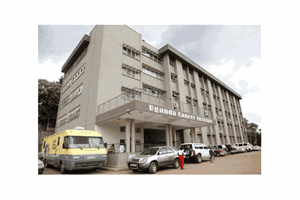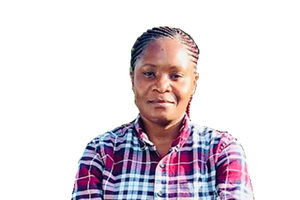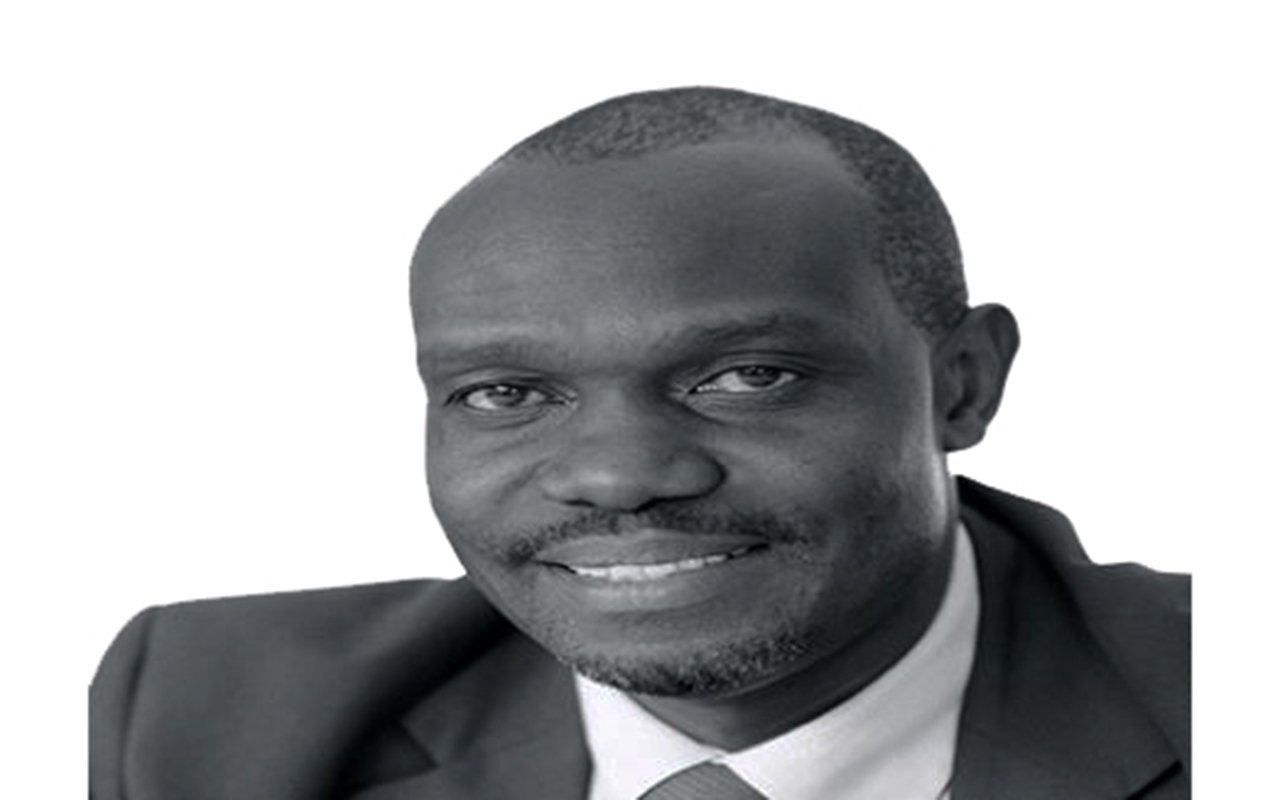
Patients and caretakers wait to be attended to at the Uganda Cancer Institute in Mulago, Kampala, in 2018. PHOTOS/FILE
Cissy Bangidde, a principal radiation therapist at the Uganda Cancer Institute (UCI), says she has normalised overtime work of around five hours, which the management does not compensate for.
Bangidde, one of the medical scientists responsible for planning and delivering life-saving doses of radiation to treat cancer patients, says she and the other staff work overtime because of the large number of patients in urgent need of care.
“Public Service [Commission] takes that we work from 8am to 5pm. [But] What is unique about us is that because of the huge cancer workload and the number of patients and the limited personnel, the staff have extended their working hours; we begin working at 4.30am and close at 8pm to be able to handle all these patients,” she narrates.
According to information from the UCI Radiation Department, 242 patients are handled at the radiotherapy machines daily.
“That is only for treatment. For the CT scan, we are scanning 15 to 17 patients daily, Monday to Friday,” Bangidde reveals, adding: “And then we also have brachytherapy treatments where we carry out treatments for cancer of the cervix, handling between 10 and 12 patients per day.”
She says in total, “that’s around 260 patients daily [at the department]”.
She further says the department handles 2,000 new cancer cases per year, not counting the re-treatments that come along the way.
Dr Jackson Orem, the UCI director, says although the staff “are overstretched” because of the large number of patients, “they are very dedicated.”
“Well, we don’t pay them for the overtime, that is also an issue. Of course, that also needs appreciation from the public that our staff are working very hard to ensure they deliver the service,” he tells this publication, adding: “And that is the reason why criticising them is not what to do. Appreciating them is by giving that extra payment that they need. Nonetheless, we need to improve the working conditions of our specialists, otherwise they’re going to run away.”
Besides the threat of specialists seeking less straining yet good-paying opportunities, some patients and caretakers at UCI say some health workers are highly irritable and mistreat them or are not available, especially on night shifts.
Although some of these vices may be linked to exhaustion due to long working hours, they are also common in many public facilities.
Dr Orem says they are struggling to address the human resource gaps and associated effects because of inadequate resources to recruit the personnel and also an inadequate number of people trained in cancer care.
He says amid the challenges, his staff have improved the quality of care and handled the rising number of patients without discrimination.
Audit findings
The congestion and long waiting hours due to the rising number of cancer patients amid inadequate staff and inadequate infrastructure at the Kampala-based UCI and another treatment centre in Mbarara, are some of the issues highlighted in the new audit query by Auditor General John Muwanga.

Dr Israel Luutu, a senior radiation oncologist consultant, shows one of the newly procured machines at the Uganda Cancer Institute on May 15.
In his “Value for Money Audit Report on the provision of super-specialised oncology (cancer) services by UCI”, Mr Muwanga says despite the above challenges, the quality of care has improved.
“During the review period (six financial years), the UCI achieved notable successes in improving the quality of care for patients from an average of 44.68 percent in 2020 to 72.48 percent in 2023,” the report reads.
The report also indicates that UCI managed to provide services to many cancer patients, “with several centres receiving significant patient traffic, conducting cancer research in 132 different areas over the last five years.”
In the report, the institute achieved this because the government released “Shs407.98 billion” for its operations “over the past six financial years,” which stretched from 2017/2018 to 2022/2023.
The UCI was established under the Uganda Cancer Institute Act of 2016 and is responsible for coordinating the prevention and treatment of cancers in Uganda.
The institute offers services, including radiotherapy, surgery, chemotherapy, palliative care and rehabilitation, through its main centre on Mulago hill, Mbarara Cancer Regional Centre and the Gulu regional centre.
“However, based on indications of performance problems such as inadequate staffing, inadequate infrastructure, inadequate research capacity, inadequate funding for drugs, and patient referrals abroad for cancer management, the Office of the Auditor General undertook a value-for-money audit to assess the extent to which UCI has provided preventive, curative and palliative services for cancer treatment in Uganda,” the report reads.
“While UCI achieved commendable improvements in patient care quality and research, the institute still faces significant challenges limiting its broader impact. Coverage of treatment within the country remains low, and vital data on patient flows and performance metrics is lacking,” the report reads further.
Idle equipment
The report reveals that there is limited community outreach.
“Unutilised equipment, overcrowding, and storage issues hamper service delivery. Notably, cancer prevention efforts are hampered by non-availability of IEC [information, education, and communication] materials and limited community outreach,” the report reads.
Details in the report show that UCI spent Shs11.8 billion on the purchase of various equipment.
“I observed that some of the equipment were not installed and, therefore, not in use, which denied patients access to services,” the Auditor General notes in the report.
Mr Muwanga also says a total sum of $2,837,909 (about Shs10.4 billion) of public funds (excluding flight, upkeep, and attendant’s costs) was incurred for the treatment of patients referred abroad for cancer treatment under the approval of the Medical Board.
“Many patients are referred out of the country when the institute cannot manage certain conditions. A review of the performance of the UCI 2015/2016 -2019/2020 strategic plan revealed that in the FY2018/2019, out of the 154 patients referred abroad for treatment, 32 (14 percent) had cancers,” the report reads.
The report also states that research findings by UCI have not translated into policy recommendations, hindering long-term cancer control strategies.
“UCI should urgently address these shortcomings to maximise its potential in combatting the national cancer burden,” the Auditor General writes.
Details in the report indicate that UCI only treated 5,071 (14 percent) of the 34,000 new cancer cases in 2023. According to the Auditor General, the “institute lacked data on patients receiving treatment at other public and private centres.”
The Auditor General, while quoting the Global Cancer Statistics 2020 report, notes that in 2020, Uganda had an estimated 62,548 adults living with cancer, with 34,008 new cancer cases. In 2023, the year of the audit, UCI treated 5,071 patients, which is only 14 percent of the new cases.
The World Health Organisation (WHO) Uganda Country Profile of 2020 indicates that in 2016, out of the 41,687 premature deaths due to non-communicable diseases, cancer contributed 37.9 percent of deaths.
Among the cancers highlighted in the same profile, the five most common cancers in adults in Uganda include cancer of the cervix, kaposi sarcoma (cancer of the mouth and digestive system), breast cancer, cancer of the prostate, and non-hodgkin lymphoma (cancer that begins in the immune system).
Of the 34,000 new cancer cases estimated for 2020, at least 2,093 were in children aged between 0 and 14, and there were 22,992 cancer deaths that year. The Auditor General, quoting the International Agency for Research on Cancer, says it is projected that by 2040, there will be 77,510 new cancer cases per year, an increase by 138 percent, signalling the need to increase prevention efforts and quality of care.
The report of the Auditor General also indicates that Uganda had three functional cancer registries that cover less than 10 percent of the Ugandan population, the limitation he says affects the quality of projections and data available for planning.
The registries in Kampala, Gulu, and Mayuge, catered for only 2.4 million, two million, and 0.7 million people respectively, out of an estimated nationwide population of 44.2 million people.
They also cover only 16 out of 146 districts countrywide, according to the report, raising questions about the accuracy of the estimates.
“Furthermore, UCI did not maintain vital monitoring data showing the performance of the services provided by the institute, for example, patient waiting time. Although UCI spent Shs11,804,265,000 on the purchase of various equipment, some of it was not installed or denied patients access to services,” the report reads.
Patients sleep on the floor
“The bed occupancy rate was 99 percent and 201 percent for UCI main centre and Mbarara regional centre, respectively. Additional beds had been provided within the wards to cater to higher numbers compared to the UCI design capacity, which was 114 beds, resulting in congestion (including being placed on floors). This exposes patients to the risk of hospital-acquired infections,” the report reads further.

Cancer patients at a hostel for cancer patients at Mulago hospital
This bed capacity is too low when compared to the estimated number of persons with cancer, 62,000 as of 2020. However, not all cancer patients require admission in the course of the treatment, especially when they come early for diagnosis and care.
According to the audit findings, essential medical supplies such as intravenous fluids and gloves at the UCI main centre in Mulago were stored in corridors of patient wards due to the absence of storage space for these supplies.
“This took up already limited space for provision of services. I also noted a lack of space to store equipment that was not installed at the time of the audit. For instance, PET (positron emission tomography) equipment was stored in the area meant for patients waiting for radiation oncology (cancer) treatment, while boxes of medicines were stored in [the] wards and at the Out Patient Department,” the report reads further.
UCI response
Dr Nixon Niyonzima, the head of research and training at the UCI, says they have “capacity for cancer care, but it is not sufficient to tackle all the patients in the country, given that we’re only getting 20 percent.”
“We need to go where the patients are, and we need to ensure every cancer patient is actually able to access cancer care,” he adds.
Regarding idle equipment, the UCI management told the Office of the Auditor General in an official response that the equipment had not been installed because of lack of space. The same reason was given for cancer patients who were sleeping on the floor, a shortfall that increases the risk of hospital-acquired infections.
“The UCI embarked on the construction of new infrastructure at the UCI-Mulago Campus, including a multipurpose building and a new in-patient facility. However, these two buildings are behind the construction schedule as a result of contractor delays. Equipment that was procured for installation in these buildings is not yet installed,” the management said.
“It is expected that these will be completed in stages, including some sections in the 2023/2024 and others in the 2024/2025 financial years. The equipment is still on warranty and will be installed in the buildings as soon as they are completed and used for patient care,” they added.
Specifically for space for patients, the management said: “The institute has more than 60,000 outpatient days per year and more than 40,000 in-patient days per year. These numbers put a severe strain on the existing infrastructure at the UCI. However, the institute has embarked on the expansion of the bed capacity at the UCI – Mulago to 350 beds.”
“In addition, the outpatient department and other patient areas at the Mulago facility are being expanded. The Uganda Cancer Institute has also embarked on the construction of four regional centres in northern Uganda, western Uganda, eastern Uganda and West Nile,” they added.
The northern Uganda centre is complete and started handling patients. The institute said the construction of the other centres is expected to begin in the 2024/2025 financial year.
“Each centre will have 80-100 beds. These centres will decongest the UCI – Mulago campus and create greater access to cancer care services in Uganda,” they told the Auditor General.
On the issue of registry, the management said they embarked on the establishment of a national cancer registry situated at the UCI–Mulago that will be a central repository for all cancer registry information from the entire country.
“The plan is to achieve registry coverage to at least 35 percent by 2026. The additional registries will be linked to each regional centre and will give a more accurate picture of cancer risks and epidemiology in the country. The UCI will continue to coordinate data from the existing registries in addition to the new registries,” the response from the management reads.
Audit recommendations
In his recommendation, the Auditor General asks the UCI accounting officer to “expedite the completion of the multipurpose building and the 350-bed inpatient building so that all uninstalled equipment is installed and made available for the service of patients.”
On the issue of staffing gaps, the Auditor General directs the accounting officer (UCI) to “liaise with the Ministry of Finance to ensure operationalisation of the new staffing structure to ensure faster service delivery.”
Mr Muwanga also advises the accounting officer to “ensure a proper needs assessment is undertaken to ensure the planned regional centres are adequate to manage the burden of cancer in the respective regions.”
He also calls for expediting “the completion of the infrastructure at the institute and satellite centres to create more capacity for managing patients.”




